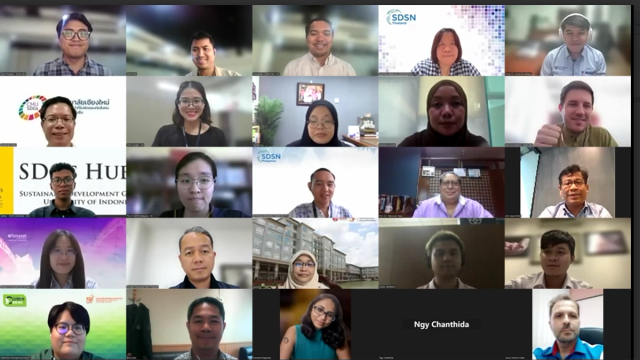SDSN Southeast Asian Members Meet to Foster Regional Collaborations
On August 22nd, 2024, SDSN Southeast Asia, SDSN Philippines, SDSN Malaysia, SDSN Thailand, and SDSN Indonesia invited their respective SDSN members to the SDSN Southeast Asia Networking Session: “Partnerships for the Goals." The aim of this closed-door virtual session was to foster collaborations and to advance SDG efforts in the region. There were 40 members in attendance represented.
Moderated by Israruddin, SDSN Southeast Asia Network Manager, the session kicked off with brief remarks by Ms. Nur Amirah binti Abdul Majid, Senior Manager, Asia Pacific Lead, Networks at SDSN on upcoming events, including SDSN’s High-Level Pre-Summit of the Future event taking place in New York in September.
Next, three members - Temasek Polytechnic Singapore, Universiti Brunei Darussalam, and Chiang Mai University, Thailand - presented on their respective institutions, including opportunities for collaboration. For example, Temasek Polytechnic Singapore shared their willingness to partner to develop an e-exchange program and Universiti Brunei Darussalam shared their eagerness to find a collaborator to co-organize the 3rd International Congress on Earth Sciences in 2025 in Southeast Asia. This member highlight moment was also important to showcase current SDG-related initiatives that could be scaled-up regionally.
Following this, Emmanuel Delocado, Network Manager of SDSN Philippines, and Phui Yi Kong, Co-Network Manager of SDSN Malaysia, shared information on how members can get the most out of SDSN resources and support.
Finally, a 30-minute networking session kicked-off where the participants shared information on the SDG-related initiatives of their institutions and opportunities for collaboration. These breakout rooms were facilitated by the local network managers Israruddin, Southeast Asia, Emmanuel Delocado, Philippines, Phui Kong, Malaysia, Nuntinee Malanon Thailand and Adnan Hasyim Wibowo, Indonesia.
Some potential areas for collaboration were identified including co-organizing events in the region (e.g., especially workshops, conference and webinars and developing professor and student exchange programs). Additionally, follow-up meetings have been arranged to further improve these regional collaboration opportunities, as it was clear from this session that regional collaborations are both possible and fruitful.
